Organisational Behaviour Report: Unilever, Culture, and Motivation
VerifiedAdded on 2022/12/27
|12
|3135
|23
Report
AI Summary
This report provides an in-depth analysis of Unilever's organisational behaviour. It begins with an executive summary and then delves into the importance of organizational culture and its impact on employees. The report explores various theoretical models related to culture and human behaviour, including conflict theory, symbolic interactionism, and classical conditioning. It then examines the importance of culture in organisational effectiveness, differentiating between strong and weak cultures. The report further investigates the role of culture in employee motivation, discussing both intrinsic and extrinsic motivation, and highlighting how culture affects absenteeism, employee retention, and growth opportunities. The final section discusses how Unilever uses its culture to drive market growth and achieve its goals. The report emphasizes the importance of a positive work environment, employee communication, and flexibility in fostering innovation and productivity. The report is a comprehensive exploration of how Unilever manages its organisational behaviour to enhance its success.
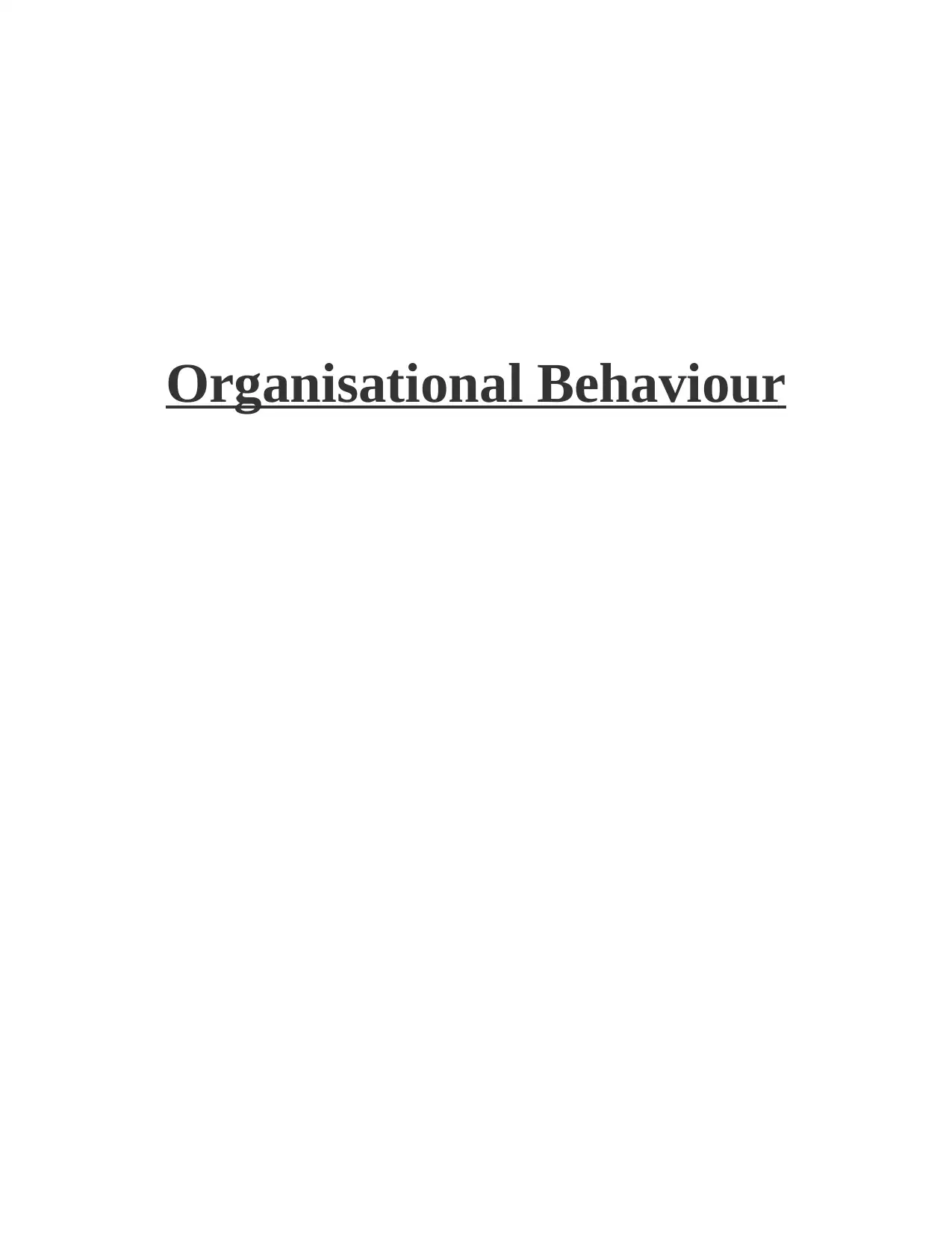
Organisational Behaviour
Paraphrase This Document
Need a fresh take? Get an instant paraphrase of this document with our AI Paraphraser
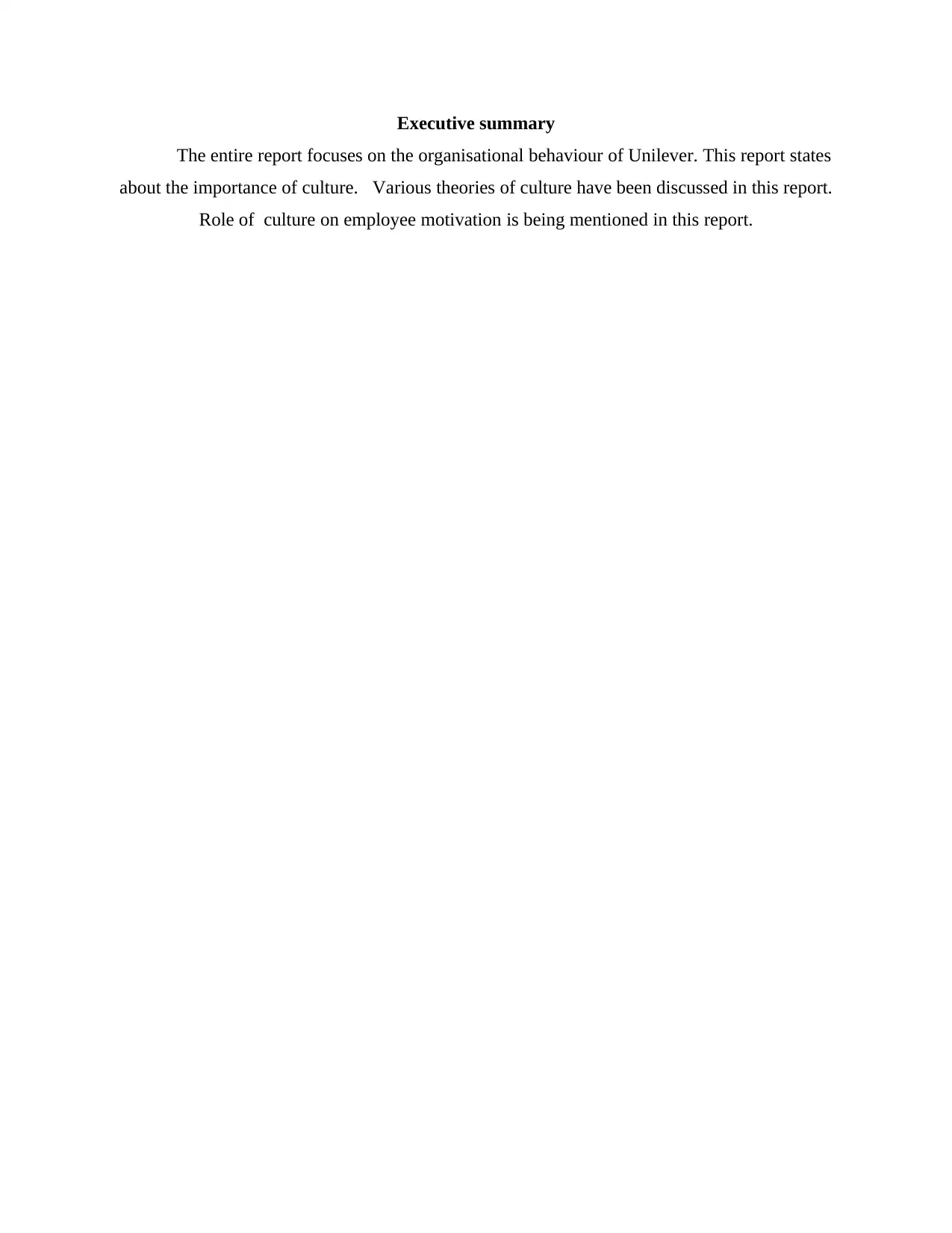
Executive summary
The entire report focuses on the organisational behaviour of Unilever. This report states
about the importance of culture. Various theories of culture have been discussed in this report.
Role of culture on employee motivation is being mentioned in this report.
The entire report focuses on the organisational behaviour of Unilever. This report states
about the importance of culture. Various theories of culture have been discussed in this report.
Role of culture on employee motivation is being mentioned in this report.
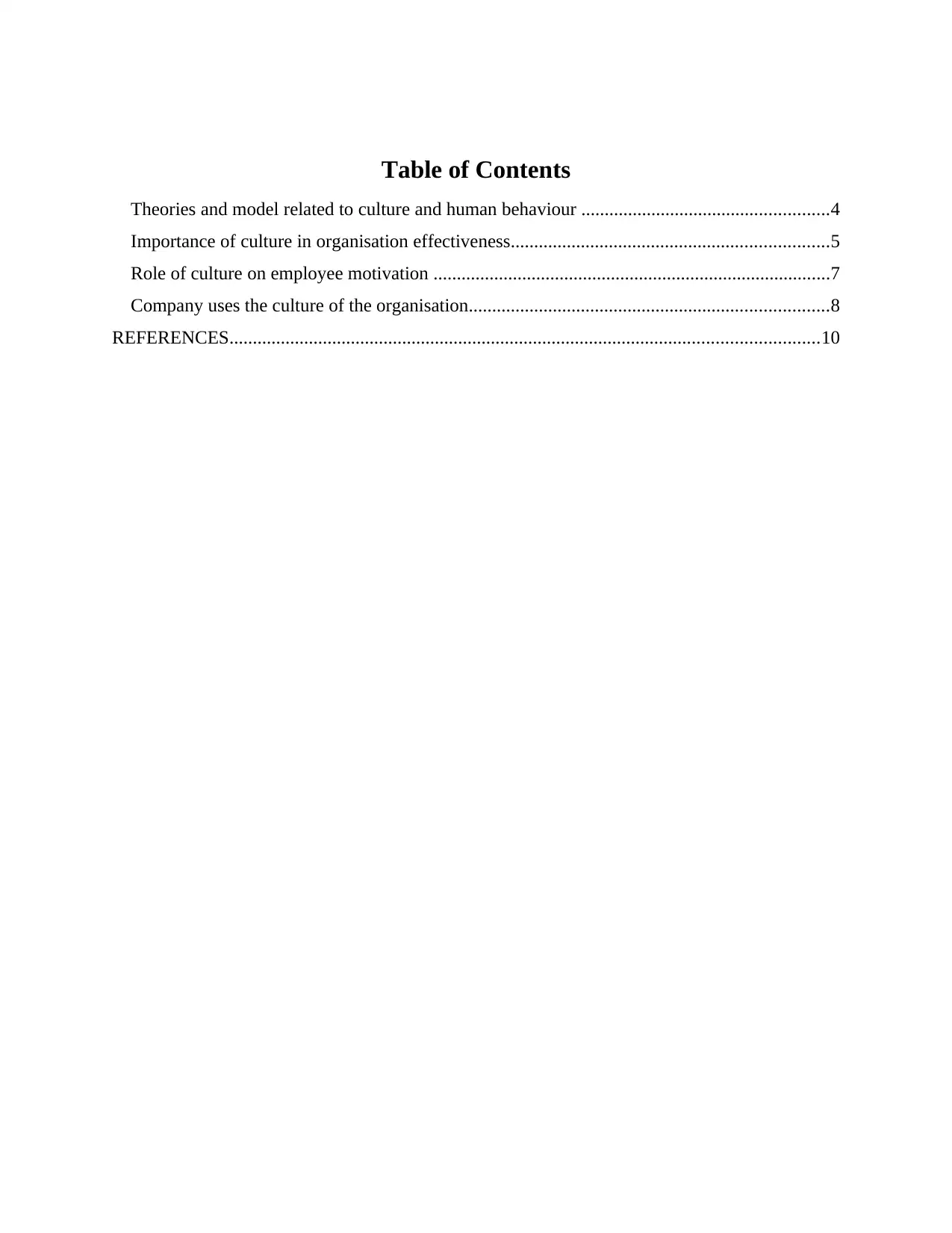
Table of Contents
Theories and model related to culture and human behaviour .....................................................4
Importance of culture in organisation effectiveness....................................................................5
Role of culture on employee motivation .....................................................................................7
Company uses the culture of the organisation.............................................................................8
REFERENCES..............................................................................................................................10
Theories and model related to culture and human behaviour .....................................................4
Importance of culture in organisation effectiveness....................................................................5
Role of culture on employee motivation .....................................................................................7
Company uses the culture of the organisation.............................................................................8
REFERENCES..............................................................................................................................10
⊘ This is a preview!⊘
Do you want full access?
Subscribe today to unlock all pages.

Trusted by 1+ million students worldwide
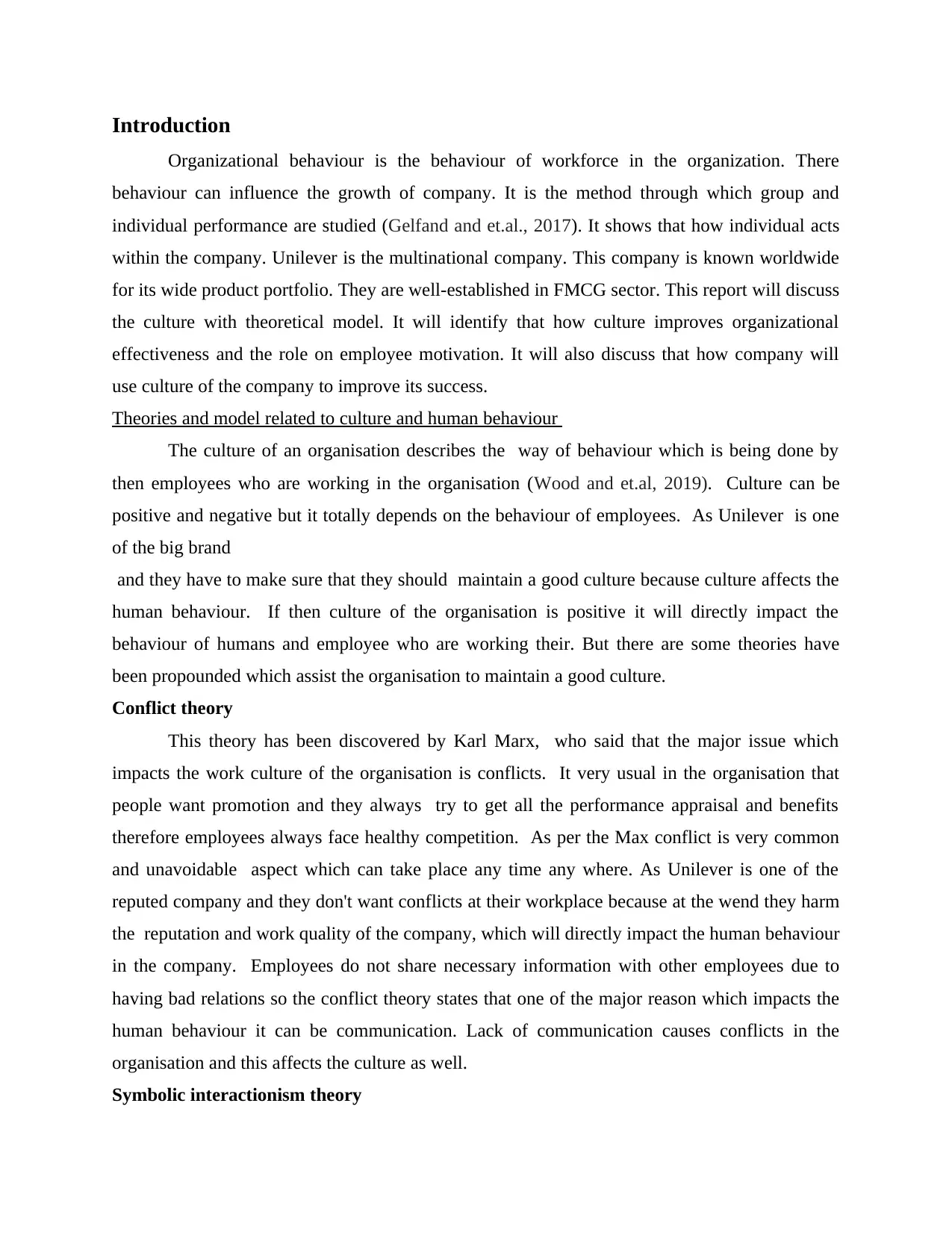
Introduction
Organizational behaviour is the behaviour of workforce in the organization. There
behaviour can influence the growth of company. It is the method through which group and
individual performance are studied (Gelfand and et.al., 2017). It shows that how individual acts
within the company. Unilever is the multinational company. This company is known worldwide
for its wide product portfolio. They are well-established in FMCG sector. This report will discuss
the culture with theoretical model. It will identify that how culture improves organizational
effectiveness and the role on employee motivation. It will also discuss that how company will
use culture of the company to improve its success.
Theories and model related to culture and human behaviour
The culture of an organisation describes the way of behaviour which is being done by
then employees who are working in the organisation (Wood and et.al, 2019). Culture can be
positive and negative but it totally depends on the behaviour of employees. As Unilever is one
of the big brand
and they have to make sure that they should maintain a good culture because culture affects the
human behaviour. If then culture of the organisation is positive it will directly impact the
behaviour of humans and employee who are working their. But there are some theories have
been propounded which assist the organisation to maintain a good culture.
Conflict theory
This theory has been discovered by Karl Marx, who said that the major issue which
impacts the work culture of the organisation is conflicts. It very usual in the organisation that
people want promotion and they always try to get all the performance appraisal and benefits
therefore employees always face healthy competition. As per the Max conflict is very common
and unavoidable aspect which can take place any time any where. As Unilever is one of the
reputed company and they don't want conflicts at their workplace because at the wend they harm
the reputation and work quality of the company, which will directly impact the human behaviour
in the company. Employees do not share necessary information with other employees due to
having bad relations so the conflict theory states that one of the major reason which impacts the
human behaviour it can be communication. Lack of communication causes conflicts in the
organisation and this affects the culture as well.
Symbolic interactionism theory
Organizational behaviour is the behaviour of workforce in the organization. There
behaviour can influence the growth of company. It is the method through which group and
individual performance are studied (Gelfand and et.al., 2017). It shows that how individual acts
within the company. Unilever is the multinational company. This company is known worldwide
for its wide product portfolio. They are well-established in FMCG sector. This report will discuss
the culture with theoretical model. It will identify that how culture improves organizational
effectiveness and the role on employee motivation. It will also discuss that how company will
use culture of the company to improve its success.
Theories and model related to culture and human behaviour
The culture of an organisation describes the way of behaviour which is being done by
then employees who are working in the organisation (Wood and et.al, 2019). Culture can be
positive and negative but it totally depends on the behaviour of employees. As Unilever is one
of the big brand
and they have to make sure that they should maintain a good culture because culture affects the
human behaviour. If then culture of the organisation is positive it will directly impact the
behaviour of humans and employee who are working their. But there are some theories have
been propounded which assist the organisation to maintain a good culture.
Conflict theory
This theory has been discovered by Karl Marx, who said that the major issue which
impacts the work culture of the organisation is conflicts. It very usual in the organisation that
people want promotion and they always try to get all the performance appraisal and benefits
therefore employees always face healthy competition. As per the Max conflict is very common
and unavoidable aspect which can take place any time any where. As Unilever is one of the
reputed company and they don't want conflicts at their workplace because at the wend they harm
the reputation and work quality of the company, which will directly impact the human behaviour
in the company. Employees do not share necessary information with other employees due to
having bad relations so the conflict theory states that one of the major reason which impacts the
human behaviour it can be communication. Lack of communication causes conflicts in the
organisation and this affects the culture as well.
Symbolic interactionism theory
Paraphrase This Document
Need a fresh take? Get an instant paraphrase of this document with our AI Paraphraser
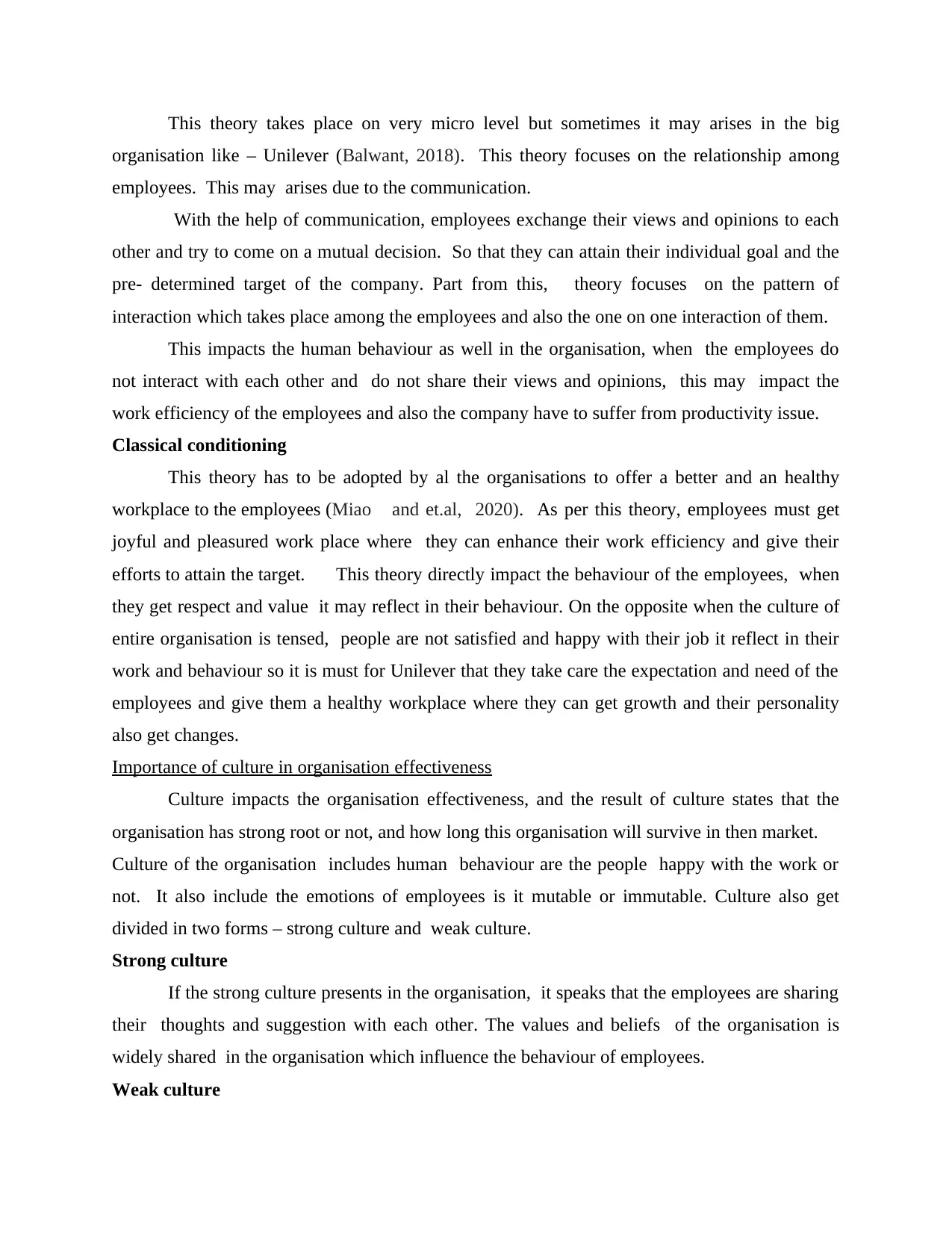
This theory takes place on very micro level but sometimes it may arises in the big
organisation like – Unilever (Balwant, 2018). This theory focuses on the relationship among
employees. This may arises due to the communication.
With the help of communication, employees exchange their views and opinions to each
other and try to come on a mutual decision. So that they can attain their individual goal and the
pre- determined target of the company. Part from this, theory focuses on the pattern of
interaction which takes place among the employees and also the one on one interaction of them.
This impacts the human behaviour as well in the organisation, when the employees do
not interact with each other and do not share their views and opinions, this may impact the
work efficiency of the employees and also the company have to suffer from productivity issue.
Classical conditioning
This theory has to be adopted by al the organisations to offer a better and an healthy
workplace to the employees (Miao and et.al, 2020). As per this theory, employees must get
joyful and pleasured work place where they can enhance their work efficiency and give their
efforts to attain the target. This theory directly impact the behaviour of the employees, when
they get respect and value it may reflect in their behaviour. On the opposite when the culture of
entire organisation is tensed, people are not satisfied and happy with their job it reflect in their
work and behaviour so it is must for Unilever that they take care the expectation and need of the
employees and give them a healthy workplace where they can get growth and their personality
also get changes.
Importance of culture in organisation effectiveness
Culture impacts the organisation effectiveness, and the result of culture states that the
organisation has strong root or not, and how long this organisation will survive in then market.
Culture of the organisation includes human behaviour are the people happy with the work or
not. It also include the emotions of employees is it mutable or immutable. Culture also get
divided in two forms – strong culture and weak culture.
Strong culture
If the strong culture presents in the organisation, it speaks that the employees are sharing
their thoughts and suggestion with each other. The values and beliefs of the organisation is
widely shared in the organisation which influence the behaviour of employees.
Weak culture
organisation like – Unilever (Balwant, 2018). This theory focuses on the relationship among
employees. This may arises due to the communication.
With the help of communication, employees exchange their views and opinions to each
other and try to come on a mutual decision. So that they can attain their individual goal and the
pre- determined target of the company. Part from this, theory focuses on the pattern of
interaction which takes place among the employees and also the one on one interaction of them.
This impacts the human behaviour as well in the organisation, when the employees do
not interact with each other and do not share their views and opinions, this may impact the
work efficiency of the employees and also the company have to suffer from productivity issue.
Classical conditioning
This theory has to be adopted by al the organisations to offer a better and an healthy
workplace to the employees (Miao and et.al, 2020). As per this theory, employees must get
joyful and pleasured work place where they can enhance their work efficiency and give their
efforts to attain the target. This theory directly impact the behaviour of the employees, when
they get respect and value it may reflect in their behaviour. On the opposite when the culture of
entire organisation is tensed, people are not satisfied and happy with their job it reflect in their
work and behaviour so it is must for Unilever that they take care the expectation and need of the
employees and give them a healthy workplace where they can get growth and their personality
also get changes.
Importance of culture in organisation effectiveness
Culture impacts the organisation effectiveness, and the result of culture states that the
organisation has strong root or not, and how long this organisation will survive in then market.
Culture of the organisation includes human behaviour are the people happy with the work or
not. It also include the emotions of employees is it mutable or immutable. Culture also get
divided in two forms – strong culture and weak culture.
Strong culture
If the strong culture presents in the organisation, it speaks that the employees are sharing
their thoughts and suggestion with each other. The values and beliefs of the organisation is
widely shared in the organisation which influence the behaviour of employees.
Weak culture
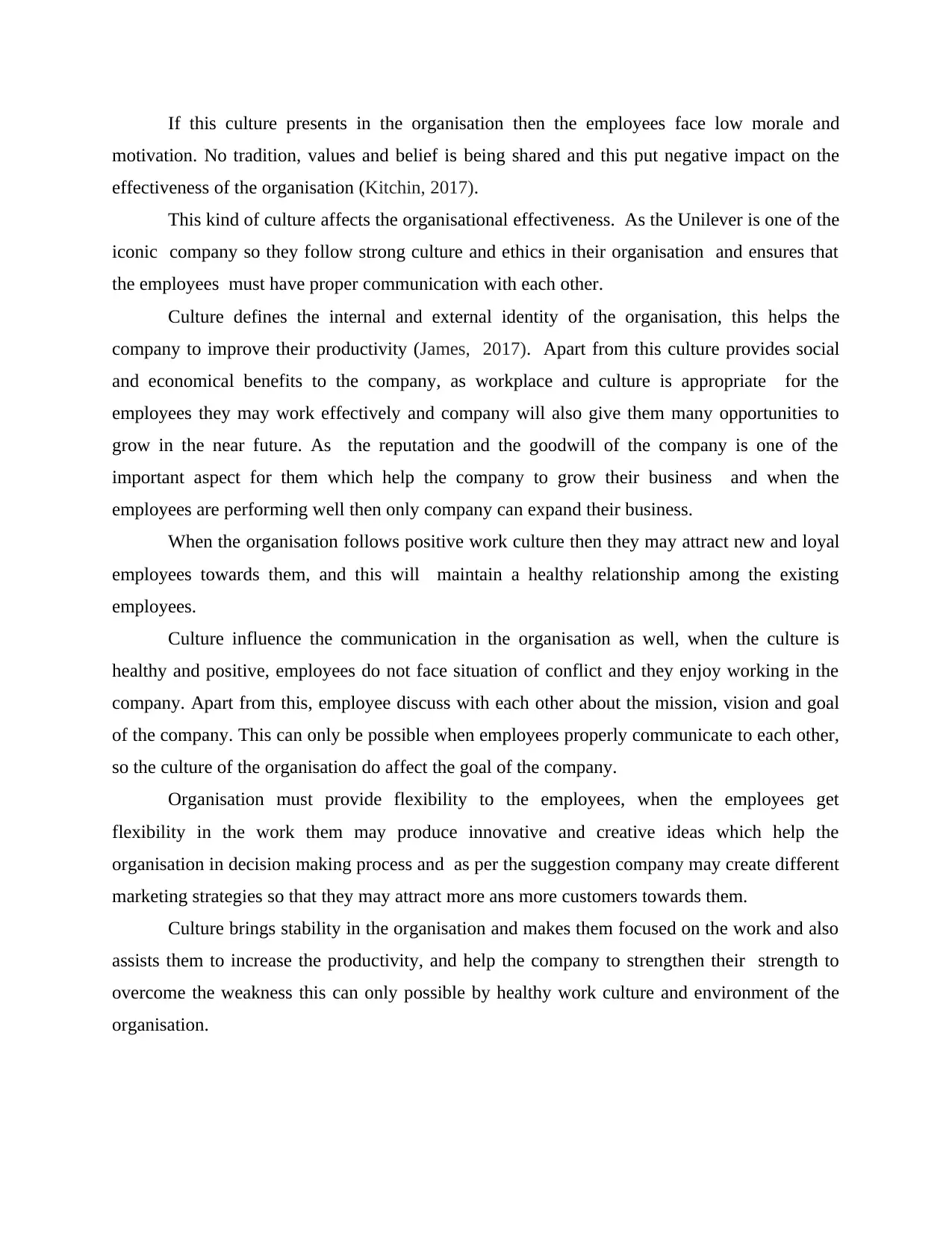
If this culture presents in the organisation then the employees face low morale and
motivation. No tradition, values and belief is being shared and this put negative impact on the
effectiveness of the organisation (Kitchin, 2017).
This kind of culture affects the organisational effectiveness. As the Unilever is one of the
iconic company so they follow strong culture and ethics in their organisation and ensures that
the employees must have proper communication with each other.
Culture defines the internal and external identity of the organisation, this helps the
company to improve their productivity (James, 2017). Apart from this culture provides social
and economical benefits to the company, as workplace and culture is appropriate for the
employees they may work effectively and company will also give them many opportunities to
grow in the near future. As the reputation and the goodwill of the company is one of the
important aspect for them which help the company to grow their business and when the
employees are performing well then only company can expand their business.
When the organisation follows positive work culture then they may attract new and loyal
employees towards them, and this will maintain a healthy relationship among the existing
employees.
Culture influence the communication in the organisation as well, when the culture is
healthy and positive, employees do not face situation of conflict and they enjoy working in the
company. Apart from this, employee discuss with each other about the mission, vision and goal
of the company. This can only be possible when employees properly communicate to each other,
so the culture of the organisation do affect the goal of the company.
Organisation must provide flexibility to the employees, when the employees get
flexibility in the work them may produce innovative and creative ideas which help the
organisation in decision making process and as per the suggestion company may create different
marketing strategies so that they may attract more ans more customers towards them.
Culture brings stability in the organisation and makes them focused on the work and also
assists them to increase the productivity, and help the company to strengthen their strength to
overcome the weakness this can only possible by healthy work culture and environment of the
organisation.
motivation. No tradition, values and belief is being shared and this put negative impact on the
effectiveness of the organisation (Kitchin, 2017).
This kind of culture affects the organisational effectiveness. As the Unilever is one of the
iconic company so they follow strong culture and ethics in their organisation and ensures that
the employees must have proper communication with each other.
Culture defines the internal and external identity of the organisation, this helps the
company to improve their productivity (James, 2017). Apart from this culture provides social
and economical benefits to the company, as workplace and culture is appropriate for the
employees they may work effectively and company will also give them many opportunities to
grow in the near future. As the reputation and the goodwill of the company is one of the
important aspect for them which help the company to grow their business and when the
employees are performing well then only company can expand their business.
When the organisation follows positive work culture then they may attract new and loyal
employees towards them, and this will maintain a healthy relationship among the existing
employees.
Culture influence the communication in the organisation as well, when the culture is
healthy and positive, employees do not face situation of conflict and they enjoy working in the
company. Apart from this, employee discuss with each other about the mission, vision and goal
of the company. This can only be possible when employees properly communicate to each other,
so the culture of the organisation do affect the goal of the company.
Organisation must provide flexibility to the employees, when the employees get
flexibility in the work them may produce innovative and creative ideas which help the
organisation in decision making process and as per the suggestion company may create different
marketing strategies so that they may attract more ans more customers towards them.
Culture brings stability in the organisation and makes them focused on the work and also
assists them to increase the productivity, and help the company to strengthen their strength to
overcome the weakness this can only possible by healthy work culture and environment of the
organisation.
⊘ This is a preview!⊘
Do you want full access?
Subscribe today to unlock all pages.

Trusted by 1+ million students worldwide
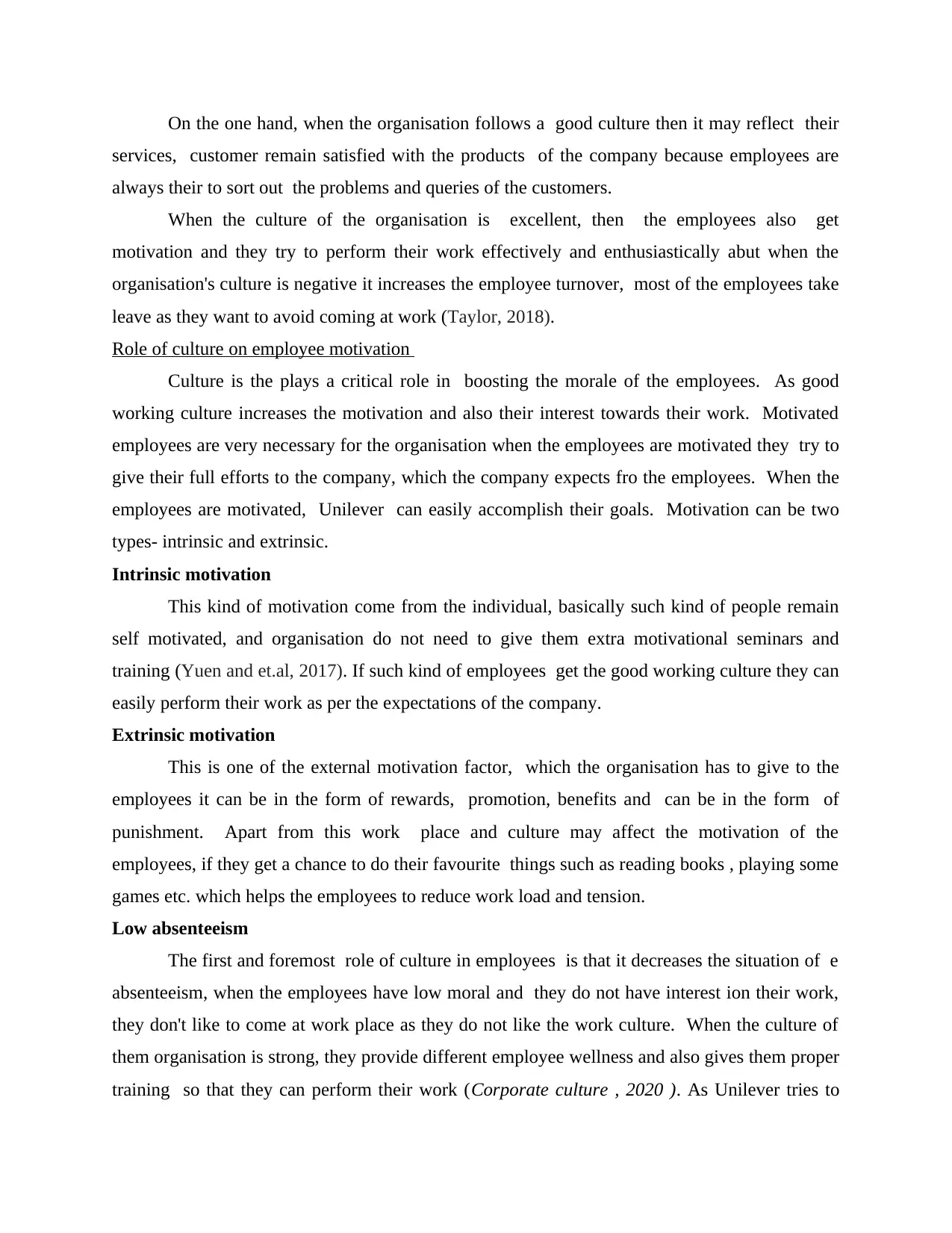
On the one hand, when the organisation follows a good culture then it may reflect their
services, customer remain satisfied with the products of the company because employees are
always their to sort out the problems and queries of the customers.
When the culture of the organisation is excellent, then the employees also get
motivation and they try to perform their work effectively and enthusiastically abut when the
organisation's culture is negative it increases the employee turnover, most of the employees take
leave as they want to avoid coming at work (Taylor, 2018).
Role of culture on employee motivation
Culture is the plays a critical role in boosting the morale of the employees. As good
working culture increases the motivation and also their interest towards their work. Motivated
employees are very necessary for the organisation when the employees are motivated they try to
give their full efforts to the company, which the company expects fro the employees. When the
employees are motivated, Unilever can easily accomplish their goals. Motivation can be two
types- intrinsic and extrinsic.
Intrinsic motivation
This kind of motivation come from the individual, basically such kind of people remain
self motivated, and organisation do not need to give them extra motivational seminars and
training (Yuen and et.al, 2017). If such kind of employees get the good working culture they can
easily perform their work as per the expectations of the company.
Extrinsic motivation
This is one of the external motivation factor, which the organisation has to give to the
employees it can be in the form of rewards, promotion, benefits and can be in the form of
punishment. Apart from this work place and culture may affect the motivation of the
employees, if they get a chance to do their favourite things such as reading books , playing some
games etc. which helps the employees to reduce work load and tension.
Low absenteeism
The first and foremost role of culture in employees is that it decreases the situation of e
absenteeism, when the employees have low moral and they do not have interest ion their work,
they don't like to come at work place as they do not like the work culture. When the culture of
them organisation is strong, they provide different employee wellness and also gives them proper
training so that they can perform their work (Corporate culture , 2020 ). As Unilever tries to
services, customer remain satisfied with the products of the company because employees are
always their to sort out the problems and queries of the customers.
When the culture of the organisation is excellent, then the employees also get
motivation and they try to perform their work effectively and enthusiastically abut when the
organisation's culture is negative it increases the employee turnover, most of the employees take
leave as they want to avoid coming at work (Taylor, 2018).
Role of culture on employee motivation
Culture is the plays a critical role in boosting the morale of the employees. As good
working culture increases the motivation and also their interest towards their work. Motivated
employees are very necessary for the organisation when the employees are motivated they try to
give their full efforts to the company, which the company expects fro the employees. When the
employees are motivated, Unilever can easily accomplish their goals. Motivation can be two
types- intrinsic and extrinsic.
Intrinsic motivation
This kind of motivation come from the individual, basically such kind of people remain
self motivated, and organisation do not need to give them extra motivational seminars and
training (Yuen and et.al, 2017). If such kind of employees get the good working culture they can
easily perform their work as per the expectations of the company.
Extrinsic motivation
This is one of the external motivation factor, which the organisation has to give to the
employees it can be in the form of rewards, promotion, benefits and can be in the form of
punishment. Apart from this work place and culture may affect the motivation of the
employees, if they get a chance to do their favourite things such as reading books , playing some
games etc. which helps the employees to reduce work load and tension.
Low absenteeism
The first and foremost role of culture in employees is that it decreases the situation of e
absenteeism, when the employees have low moral and they do not have interest ion their work,
they don't like to come at work place as they do not like the work culture. When the culture of
them organisation is strong, they provide different employee wellness and also gives them proper
training so that they can perform their work (Corporate culture , 2020 ). As Unilever tries to
Paraphrase This Document
Need a fresh take? Get an instant paraphrase of this document with our AI Paraphraser
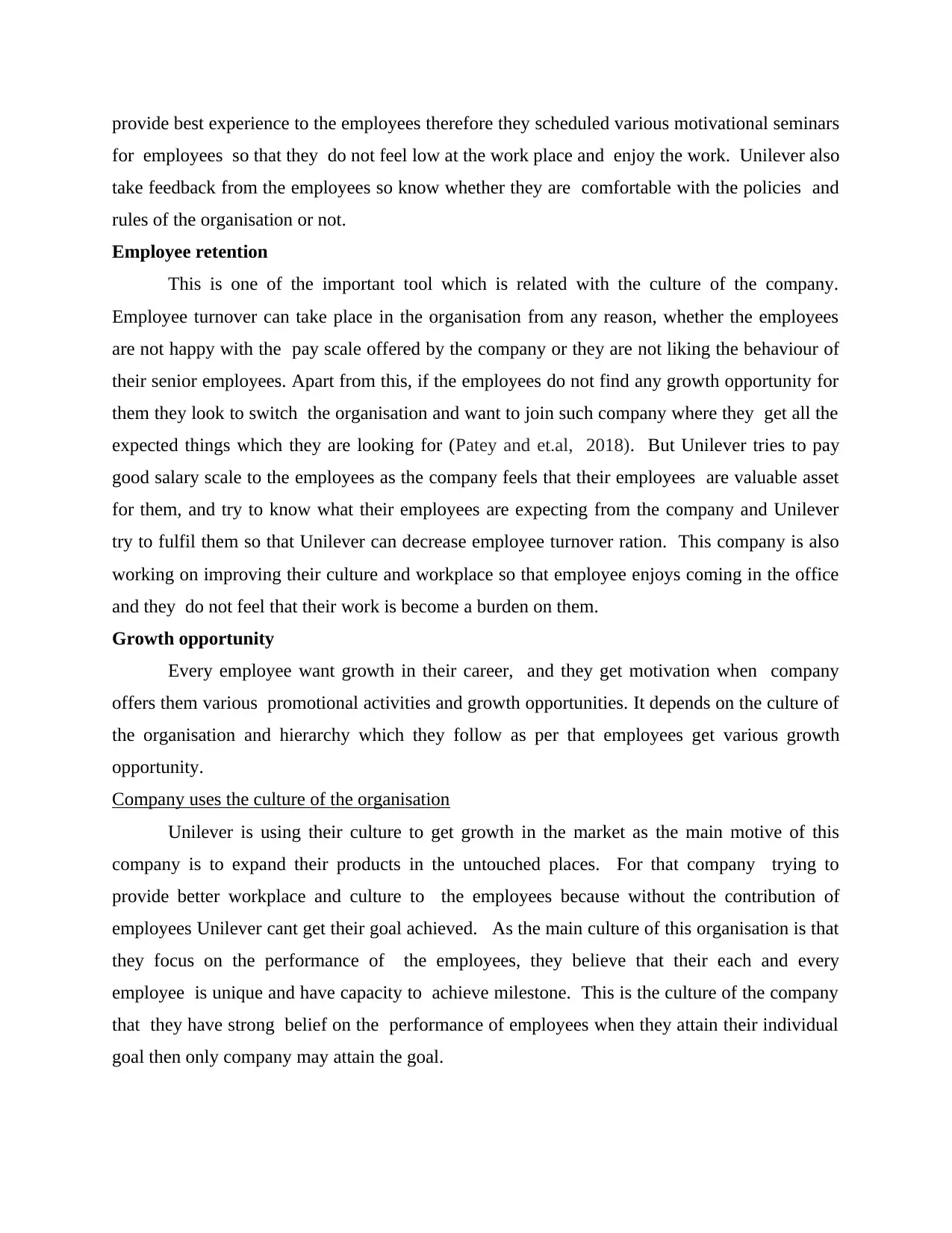
provide best experience to the employees therefore they scheduled various motivational seminars
for employees so that they do not feel low at the work place and enjoy the work. Unilever also
take feedback from the employees so know whether they are comfortable with the policies and
rules of the organisation or not.
Employee retention
This is one of the important tool which is related with the culture of the company.
Employee turnover can take place in the organisation from any reason, whether the employees
are not happy with the pay scale offered by the company or they are not liking the behaviour of
their senior employees. Apart from this, if the employees do not find any growth opportunity for
them they look to switch the organisation and want to join such company where they get all the
expected things which they are looking for (Patey and et.al, 2018). But Unilever tries to pay
good salary scale to the employees as the company feels that their employees are valuable asset
for them, and try to know what their employees are expecting from the company and Unilever
try to fulfil them so that Unilever can decrease employee turnover ration. This company is also
working on improving their culture and workplace so that employee enjoys coming in the office
and they do not feel that their work is become a burden on them.
Growth opportunity
Every employee want growth in their career, and they get motivation when company
offers them various promotional activities and growth opportunities. It depends on the culture of
the organisation and hierarchy which they follow as per that employees get various growth
opportunity.
Company uses the culture of the organisation
Unilever is using their culture to get growth in the market as the main motive of this
company is to expand their products in the untouched places. For that company trying to
provide better workplace and culture to the employees because without the contribution of
employees Unilever cant get their goal achieved. As the main culture of this organisation is that
they focus on the performance of the employees, they believe that their each and every
employee is unique and have capacity to achieve milestone. This is the culture of the company
that they have strong belief on the performance of employees when they attain their individual
goal then only company may attain the goal.
for employees so that they do not feel low at the work place and enjoy the work. Unilever also
take feedback from the employees so know whether they are comfortable with the policies and
rules of the organisation or not.
Employee retention
This is one of the important tool which is related with the culture of the company.
Employee turnover can take place in the organisation from any reason, whether the employees
are not happy with the pay scale offered by the company or they are not liking the behaviour of
their senior employees. Apart from this, if the employees do not find any growth opportunity for
them they look to switch the organisation and want to join such company where they get all the
expected things which they are looking for (Patey and et.al, 2018). But Unilever tries to pay
good salary scale to the employees as the company feels that their employees are valuable asset
for them, and try to know what their employees are expecting from the company and Unilever
try to fulfil them so that Unilever can decrease employee turnover ration. This company is also
working on improving their culture and workplace so that employee enjoys coming in the office
and they do not feel that their work is become a burden on them.
Growth opportunity
Every employee want growth in their career, and they get motivation when company
offers them various promotional activities and growth opportunities. It depends on the culture of
the organisation and hierarchy which they follow as per that employees get various growth
opportunity.
Company uses the culture of the organisation
Unilever is using their culture to get growth in the market as the main motive of this
company is to expand their products in the untouched places. For that company trying to
provide better workplace and culture to the employees because without the contribution of
employees Unilever cant get their goal achieved. As the main culture of this organisation is that
they focus on the performance of the employees, they believe that their each and every
employee is unique and have capacity to achieve milestone. This is the culture of the company
that they have strong belief on the performance of employees when they attain their individual
goal then only company may attain the goal.
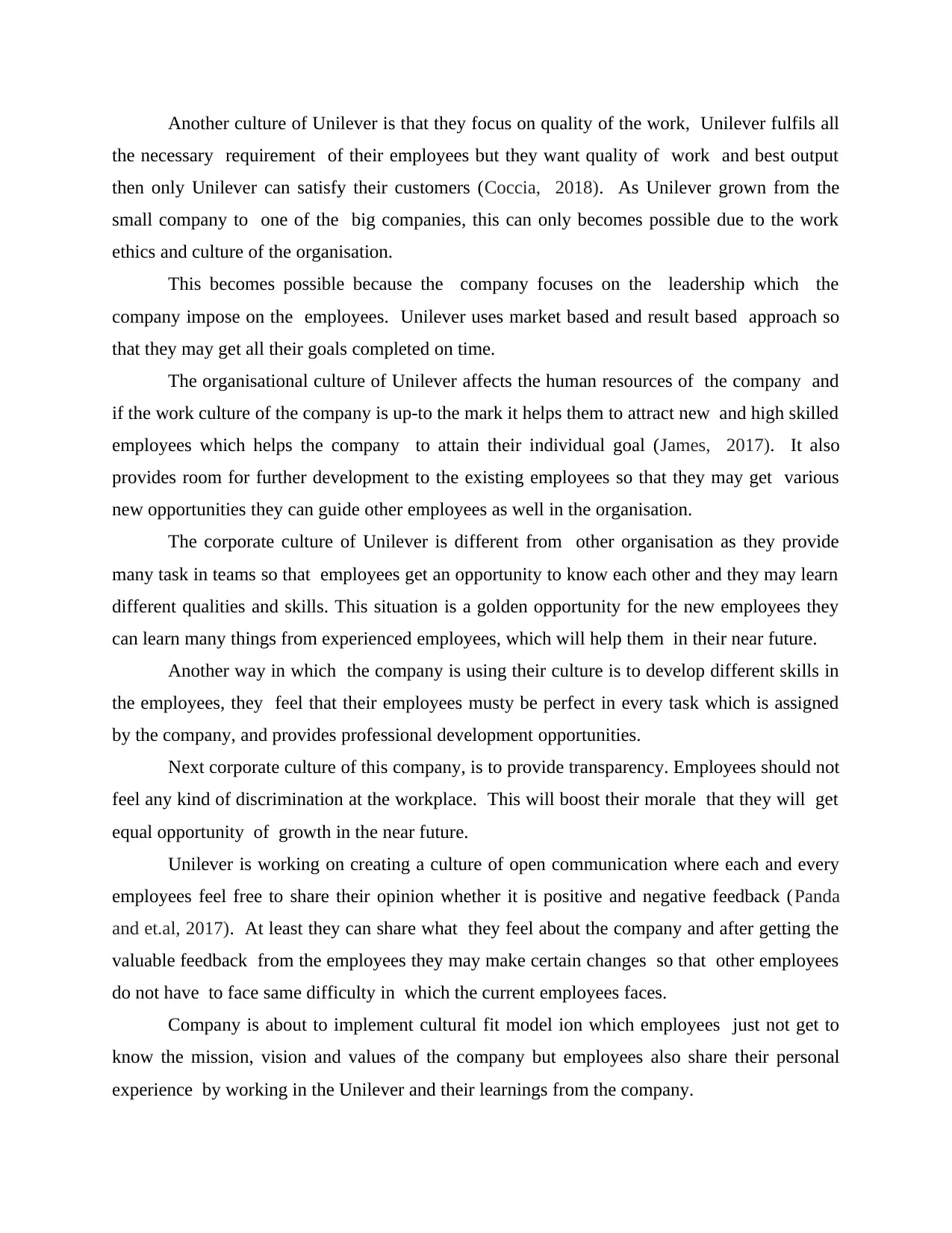
Another culture of Unilever is that they focus on quality of the work, Unilever fulfils all
the necessary requirement of their employees but they want quality of work and best output
then only Unilever can satisfy their customers (Coccia, 2018). As Unilever grown from the
small company to one of the big companies, this can only becomes possible due to the work
ethics and culture of the organisation.
This becomes possible because the company focuses on the leadership which the
company impose on the employees. Unilever uses market based and result based approach so
that they may get all their goals completed on time.
The organisational culture of Unilever affects the human resources of the company and
if the work culture of the company is up-to the mark it helps them to attract new and high skilled
employees which helps the company to attain their individual goal (James, 2017). It also
provides room for further development to the existing employees so that they may get various
new opportunities they can guide other employees as well in the organisation.
The corporate culture of Unilever is different from other organisation as they provide
many task in teams so that employees get an opportunity to know each other and they may learn
different qualities and skills. This situation is a golden opportunity for the new employees they
can learn many things from experienced employees, which will help them in their near future.
Another way in which the company is using their culture is to develop different skills in
the employees, they feel that their employees musty be perfect in every task which is assigned
by the company, and provides professional development opportunities.
Next corporate culture of this company, is to provide transparency. Employees should not
feel any kind of discrimination at the workplace. This will boost their morale that they will get
equal opportunity of growth in the near future.
Unilever is working on creating a culture of open communication where each and every
employees feel free to share their opinion whether it is positive and negative feedback (Panda
and et.al, 2017). At least they can share what they feel about the company and after getting the
valuable feedback from the employees they may make certain changes so that other employees
do not have to face same difficulty in which the current employees faces.
Company is about to implement cultural fit model ion which employees just not get to
know the mission, vision and values of the company but employees also share their personal
experience by working in the Unilever and their learnings from the company.
the necessary requirement of their employees but they want quality of work and best output
then only Unilever can satisfy their customers (Coccia, 2018). As Unilever grown from the
small company to one of the big companies, this can only becomes possible due to the work
ethics and culture of the organisation.
This becomes possible because the company focuses on the leadership which the
company impose on the employees. Unilever uses market based and result based approach so
that they may get all their goals completed on time.
The organisational culture of Unilever affects the human resources of the company and
if the work culture of the company is up-to the mark it helps them to attract new and high skilled
employees which helps the company to attain their individual goal (James, 2017). It also
provides room for further development to the existing employees so that they may get various
new opportunities they can guide other employees as well in the organisation.
The corporate culture of Unilever is different from other organisation as they provide
many task in teams so that employees get an opportunity to know each other and they may learn
different qualities and skills. This situation is a golden opportunity for the new employees they
can learn many things from experienced employees, which will help them in their near future.
Another way in which the company is using their culture is to develop different skills in
the employees, they feel that their employees musty be perfect in every task which is assigned
by the company, and provides professional development opportunities.
Next corporate culture of this company, is to provide transparency. Employees should not
feel any kind of discrimination at the workplace. This will boost their morale that they will get
equal opportunity of growth in the near future.
Unilever is working on creating a culture of open communication where each and every
employees feel free to share their opinion whether it is positive and negative feedback (Panda
and et.al, 2017). At least they can share what they feel about the company and after getting the
valuable feedback from the employees they may make certain changes so that other employees
do not have to face same difficulty in which the current employees faces.
Company is about to implement cultural fit model ion which employees just not get to
know the mission, vision and values of the company but employees also share their personal
experience by working in the Unilever and their learnings from the company.
⊘ This is a preview!⊘
Do you want full access?
Subscribe today to unlock all pages.

Trusted by 1+ million students worldwide
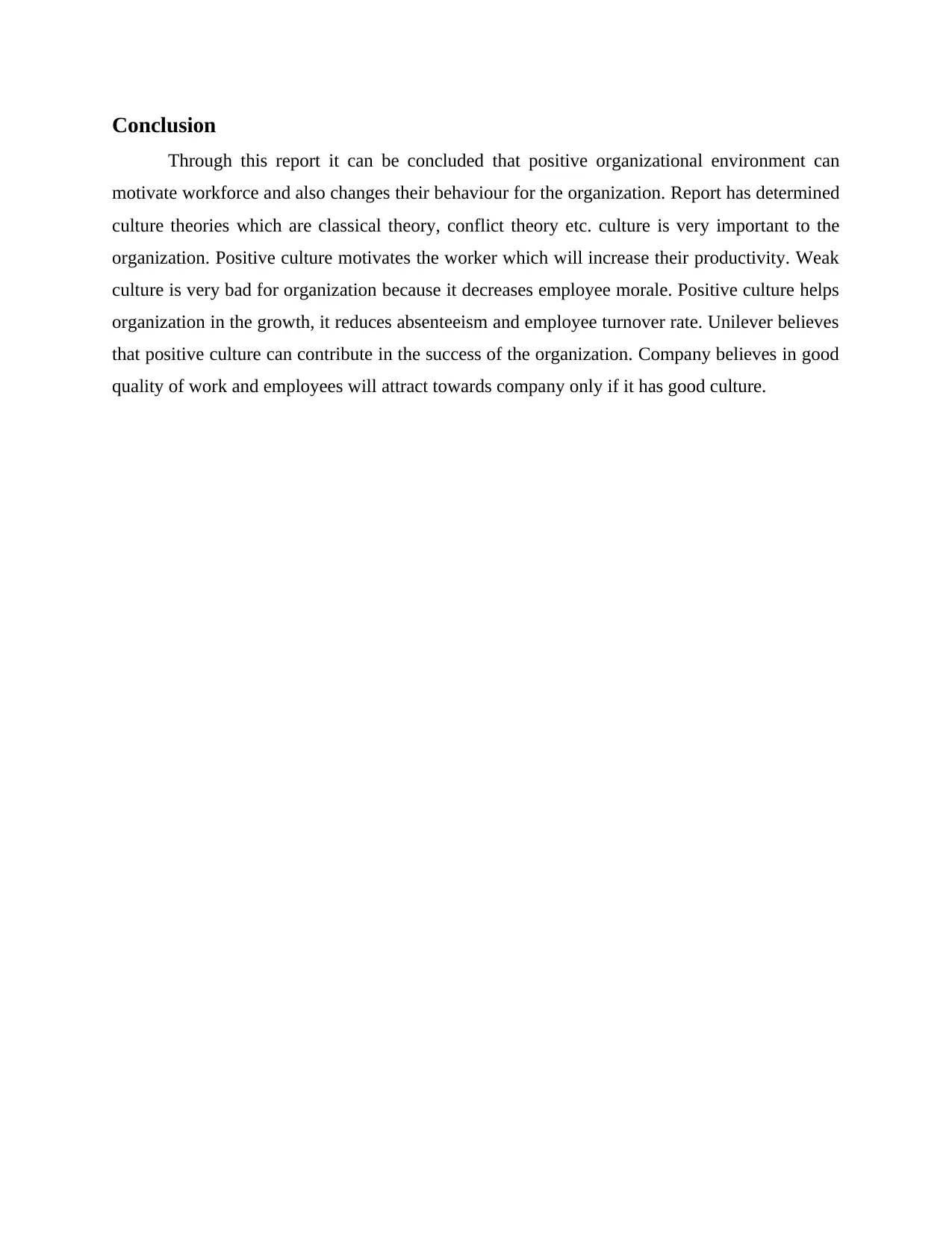
Conclusion
Through this report it can be concluded that positive organizational environment can
motivate workforce and also changes their behaviour for the organization. Report has determined
culture theories which are classical theory, conflict theory etc. culture is very important to the
organization. Positive culture motivates the worker which will increase their productivity. Weak
culture is very bad for organization because it decreases employee morale. Positive culture helps
organization in the growth, it reduces absenteeism and employee turnover rate. Unilever believes
that positive culture can contribute in the success of the organization. Company believes in good
quality of work and employees will attract towards company only if it has good culture.
Through this report it can be concluded that positive organizational environment can
motivate workforce and also changes their behaviour for the organization. Report has determined
culture theories which are classical theory, conflict theory etc. culture is very important to the
organization. Positive culture motivates the worker which will increase their productivity. Weak
culture is very bad for organization because it decreases employee morale. Positive culture helps
organization in the growth, it reduces absenteeism and employee turnover rate. Unilever believes
that positive culture can contribute in the success of the organization. Company believes in good
quality of work and employees will attract towards company only if it has good culture.
Paraphrase This Document
Need a fresh take? Get an instant paraphrase of this document with our AI Paraphraser
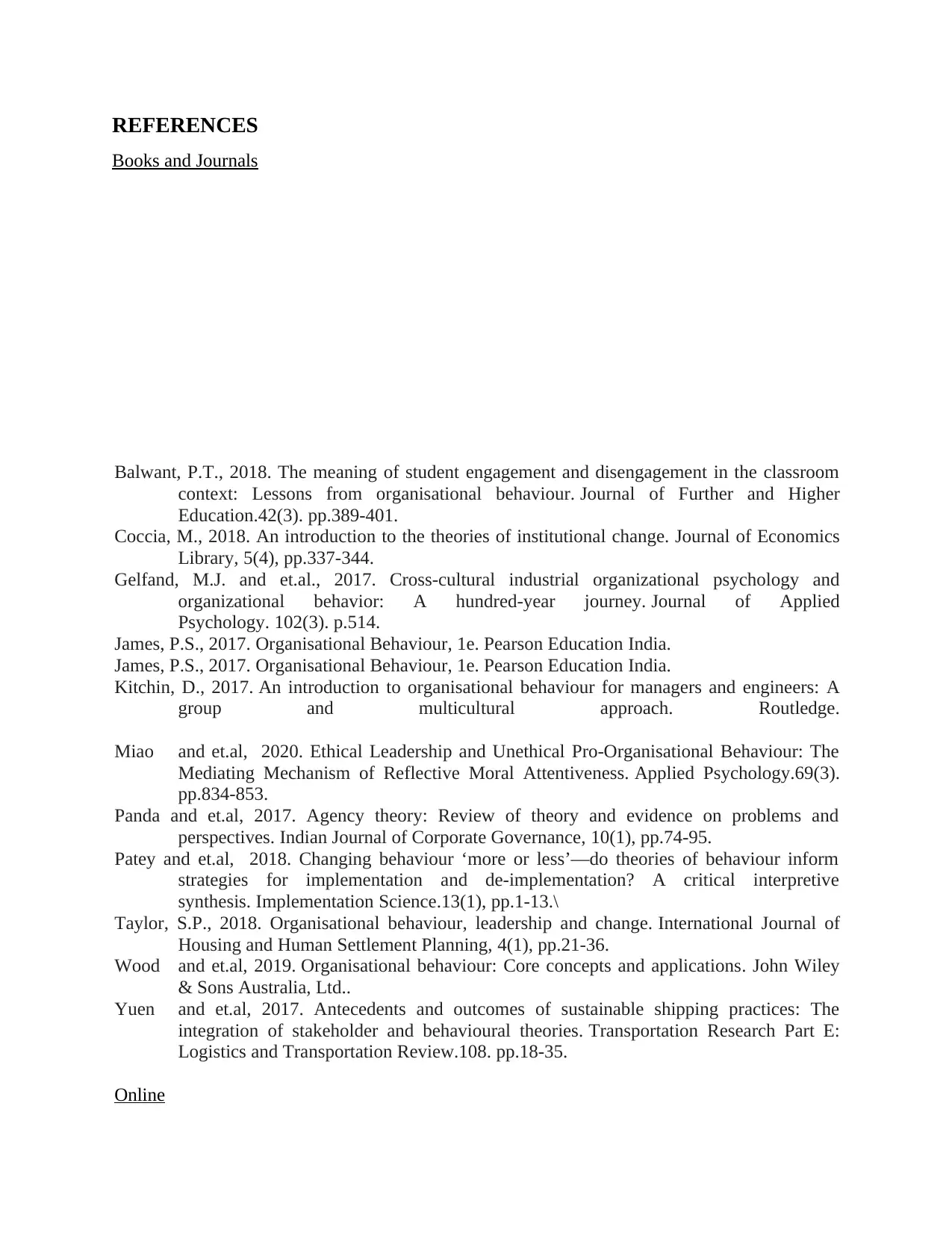
REFERENCES
Books and Journals
Balwant, P.T., 2018. The meaning of student engagement and disengagement in the classroom
context: Lessons from organisational behaviour. Journal of Further and Higher
Education.42(3). pp.389-401.
Coccia, M., 2018. An introduction to the theories of institutional change. Journal of Economics
Library, 5(4), pp.337-344.
Gelfand, M.J. and et.al., 2017. Cross-cultural industrial organizational psychology and
organizational behavior: A hundred-year journey. Journal of Applied
Psychology. 102(3). p.514.
James, P.S., 2017. Organisational Behaviour, 1e. Pearson Education India.
James, P.S., 2017. Organisational Behaviour, 1e. Pearson Education India.
Kitchin, D., 2017. An introduction to organisational behaviour for managers and engineers: A
group and multicultural approach. Routledge.
Miao and et.al, 2020. Ethical Leadership and Unethical Pro‐Organisational Behaviour: The
Mediating Mechanism of Reflective Moral Attentiveness. Applied Psychology.69(3).
pp.834-853.
Panda and et.al, 2017. Agency theory: Review of theory and evidence on problems and
perspectives. Indian Journal of Corporate Governance, 10(1), pp.74-95.
Patey and et.al, 2018. Changing behaviour ‘more or less’—do theories of behaviour inform
strategies for implementation and de-implementation? A critical interpretive
synthesis. Implementation Science.13(1), pp.1-13.\
Taylor, S.P., 2018. Organisational behaviour, leadership and change. International Journal of
Housing and Human Settlement Planning, 4(1), pp.21-36.
Wood and et.al, 2019. Organisational behaviour: Core concepts and applications. John Wiley
& Sons Australia, Ltd..
Yuen and et.al, 2017. Antecedents and outcomes of sustainable shipping practices: The
integration of stakeholder and behavioural theories. Transportation Research Part E:
Logistics and Transportation Review.108. pp.18-35.
Online
Books and Journals
Balwant, P.T., 2018. The meaning of student engagement and disengagement in the classroom
context: Lessons from organisational behaviour. Journal of Further and Higher
Education.42(3). pp.389-401.
Coccia, M., 2018. An introduction to the theories of institutional change. Journal of Economics
Library, 5(4), pp.337-344.
Gelfand, M.J. and et.al., 2017. Cross-cultural industrial organizational psychology and
organizational behavior: A hundred-year journey. Journal of Applied
Psychology. 102(3). p.514.
James, P.S., 2017. Organisational Behaviour, 1e. Pearson Education India.
James, P.S., 2017. Organisational Behaviour, 1e. Pearson Education India.
Kitchin, D., 2017. An introduction to organisational behaviour for managers and engineers: A
group and multicultural approach. Routledge.
Miao and et.al, 2020. Ethical Leadership and Unethical Pro‐Organisational Behaviour: The
Mediating Mechanism of Reflective Moral Attentiveness. Applied Psychology.69(3).
pp.834-853.
Panda and et.al, 2017. Agency theory: Review of theory and evidence on problems and
perspectives. Indian Journal of Corporate Governance, 10(1), pp.74-95.
Patey and et.al, 2018. Changing behaviour ‘more or less’—do theories of behaviour inform
strategies for implementation and de-implementation? A critical interpretive
synthesis. Implementation Science.13(1), pp.1-13.\
Taylor, S.P., 2018. Organisational behaviour, leadership and change. International Journal of
Housing and Human Settlement Planning, 4(1), pp.21-36.
Wood and et.al, 2019. Organisational behaviour: Core concepts and applications. John Wiley
& Sons Australia, Ltd..
Yuen and et.al, 2017. Antecedents and outcomes of sustainable shipping practices: The
integration of stakeholder and behavioural theories. Transportation Research Part E:
Logistics and Transportation Review.108. pp.18-35.
Online
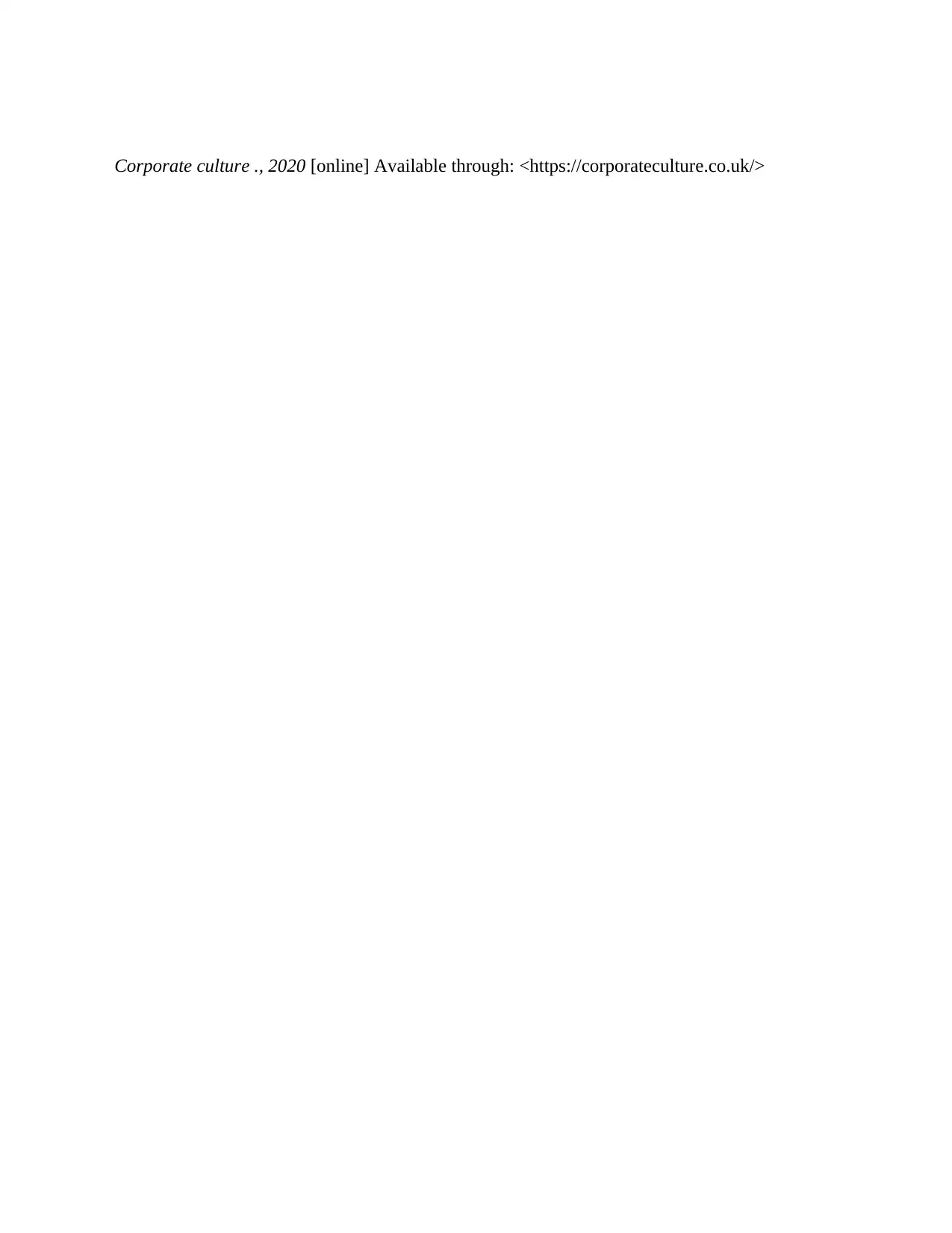
Corporate culture ., 2020 [online] Available through: <https://corporateculture.co.uk/>
⊘ This is a preview!⊘
Do you want full access?
Subscribe today to unlock all pages.

Trusted by 1+ million students worldwide
1 out of 12
Related Documents
Your All-in-One AI-Powered Toolkit for Academic Success.
+13062052269
info@desklib.com
Available 24*7 on WhatsApp / Email
![[object Object]](/_next/static/media/star-bottom.7253800d.svg)
Unlock your academic potential
Copyright © 2020–2026 A2Z Services. All Rights Reserved. Developed and managed by ZUCOL.





